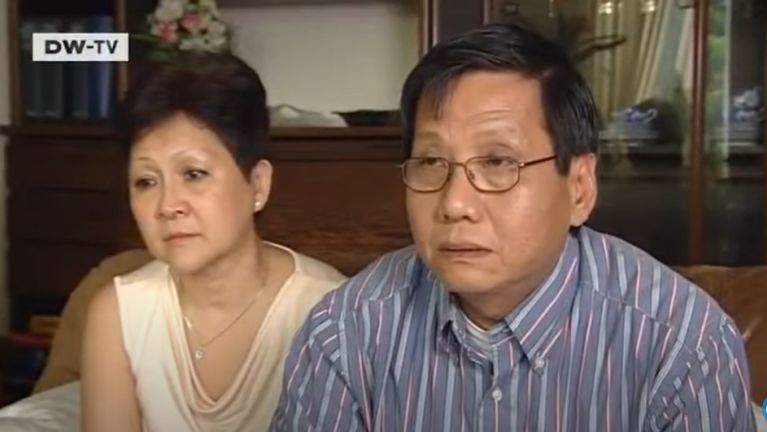“The Germans were very open and helpful”
It was 45 years ago that the first refugee “Boat People” from Vietnam reached Germany. A Vietnamese family describes the impression that new start made on them.
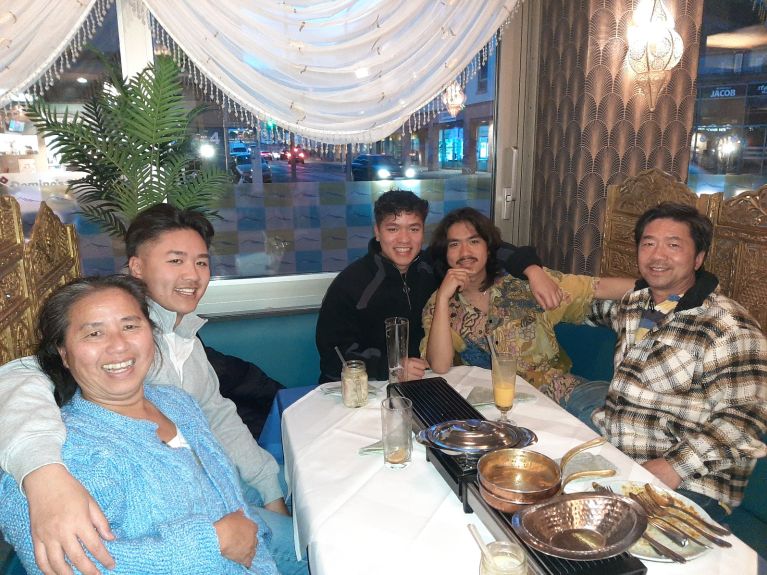
Shortly before Christmas 1979 Tôn-Vinh Trịnh-Đỗ saw snow for the first time in his life. The dormitory of the Dominican Cloister in Speyer where he and other Vietnamese boys were staying was buzzing with excitement. “We all ran to the window to touch the snowflakes” Tôn-Vinh Trịnh-Đỗ, now aged 57, recalls. “The next day we rolled around in the snow outside. That was the first time since fleeing Vietnam that I had felt completely at ease, completely free of fear.” As a twelve-year-old he and more than 60 other South Vietnamese refugees had boarded a tiny boat to escape their homeland.
We rolled around in the snow. That was the first time since fleeing Vietnam that I had felt completely at ease, completely free of fear.
It’s a December afternoon and Tôn-Vinh Trịnh-Đỗ and his wife Hòa Trương, also 57, are sitting down for tea and biscuits in their youngest son’s cosy old shared flat, where he lives as an engineering student at the Karlsruher Institute of Technology. Hòa Trương also fled Vietnam as a refugee. She came to Germany with her parents and siblings in 1982 through a programme to reunite families, as two of her sisters were living in the Ursuline convent in Ahrweiler. “At first I felt unbearable homesickness for Vietnam,” Hòa Trương recalls. “But the Germans were very helpful and open. They gave us clothes and toys and we felt welcome.”
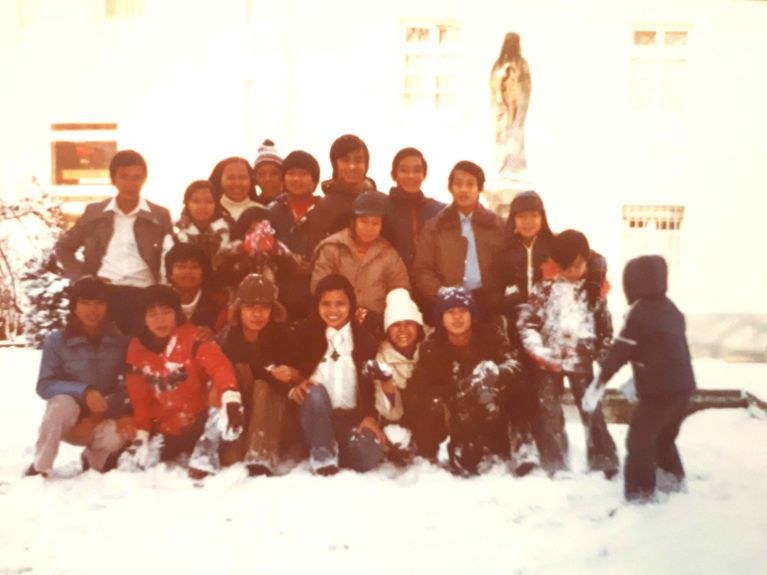
After the Vietnam War ended in 1975, 1.4 million South Vietnamese people fled their homeland on boats to escape execution, forced relocation and internment in communist reeducation camps. Tens of thousands of these “boat people” drowned. Tôn-Vinh Trịnh-Đỗ and his cousin’s family risked the journey after the government closed his Catholic boarding school. “Back then I dreamed of becoming a priest, and in Vietnam it was no longer possible to live out my faith,” he says.
Dieses YouTube-Video kann in einem neuen Tab abgespielt werden
YouTube öffnenThird party content
We use YouTube to embed content that may collect data about your activity. Please review the details and accept the service to see this content.
Open consent formTheir boat drifted over the South China Sea for 13 days. They were attacked by pirates several times, who only let them go on their way because there was nothing to steal, Trịnh-Đỗ explains. They ran short of food and water, and two children on board died of thirst. At last the boat reached an Indonesian island where the people were taken to a collection point run by the United Nations Refugee Agency. “Luckily I was taken in by a local family,” Trịnh-Đỗ says. Months later a representative of the Dominican Cloister in Germany came to Indonesia to take Vietnamese children who had left Vietnam without their parents to Germany.
Generous family reunification scheme
Media reports about the suffering of the Boat People who were living in appalling conditions in over-filled camps in South East Asia let to Germany admitting the first thousand Vietnamese people in 1978. Following pressure by the United Nations in 1979 the German government said it would accept a contingent of another 10,000 refugees. This number was increased several times in the years that followed, not least because the journalist Rupert Neudeck and other campaigners rescued some 10,000 Boat People from the South China Sea in the period up to 1986. A new category of “humanitarian refugees” was created for the Vietnamese people and generous rules applied to reuniting families.
You could say I had fallen out of the nest and the nuns and my foster parents took me in.
There was great sympathy for the Boat People among the public in Germany, too. Many families took in foster children from Vietnam and Trịnh-Đỗ came to a German family. “One of my favourite words in German is “Nestwärme,” he says, referring to the German term which describes a warm, protective and familiar environment. “You could say I had fallen out of the nest and the nuns and my foster parents took me in.” In the period after he arrived in Germany, Trịnh-Đỗ spoke with a stammer. “The trauma creeps into your soul. It wasn’t until much later when I was on a training course that I came to realise that your emotional life goes numb after terrible experiences, it kind of freezes up. At that time I learned the piano and my foster father enrolled me in a judo club, both of which helped me a lot,” he says. When Trịnh-Đỗ was 16 his parents and two sisters were at last able to join him in Germany. The family had lived with false documents for many years because their father, a former radio presenter and committed trade unionist, had been persecuted by the government.
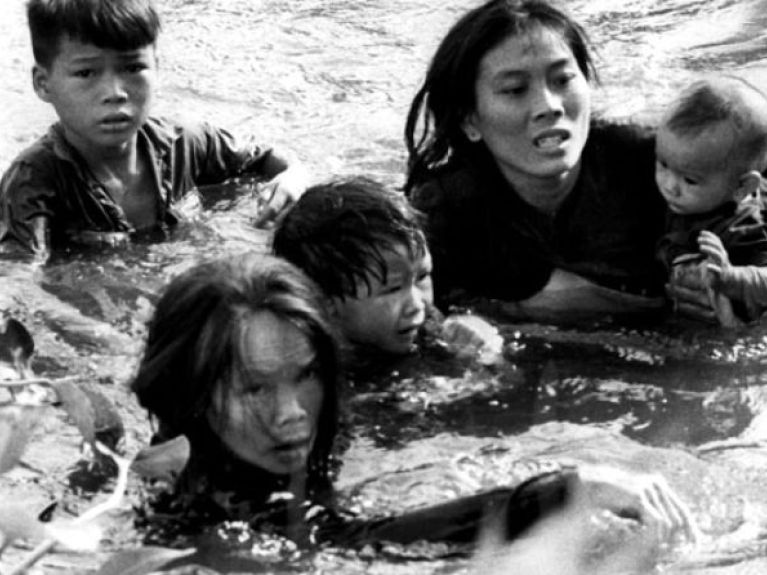
Tôn-Vinh Trịnh-Đỗ studied theology and later social pedagogy at university, and now he is a departmental head for the Caritas charity organisation in Ludwigshafen. Hòa Trương also studied social pedagogy and now works in a residential home for people with mental illness. Their oldest son runs a successful e-commerce startup and the other son studies philosophy.
Trịnh-Đỗ is particularly proud that his children are involved in social issues and cultural life. In his youngest son’s room in the shared flat in Karlsruhe, the first thing that catches your eye is a keyboard with Christmas music on it. “When I get home after uni I relax by playing,” says the 19-year-old, who often plays with his band at public and private parties across the whole of South-West Germany.
A need to help others
Tôn-Vinh Trịnh-Đỗ and his wife give up much of their free time to volunteer with their church community and for ACAT, a human rights organisation which campaigns for political prisoners in Vietnam and their relatives. After German reunification, when former Vietnamese contract labourers from East Germany were sent to live in municipalities across Germany, Trịnh-Đỗ taught their children for free. He has been helping refugees from around the world since 2015. “Many Boat People went into careers in healthcare and social work. War children often feel a great need to help others,” he says. “The feeling of self-efficacy – rather than just being a powerless object – is incredibly important.”
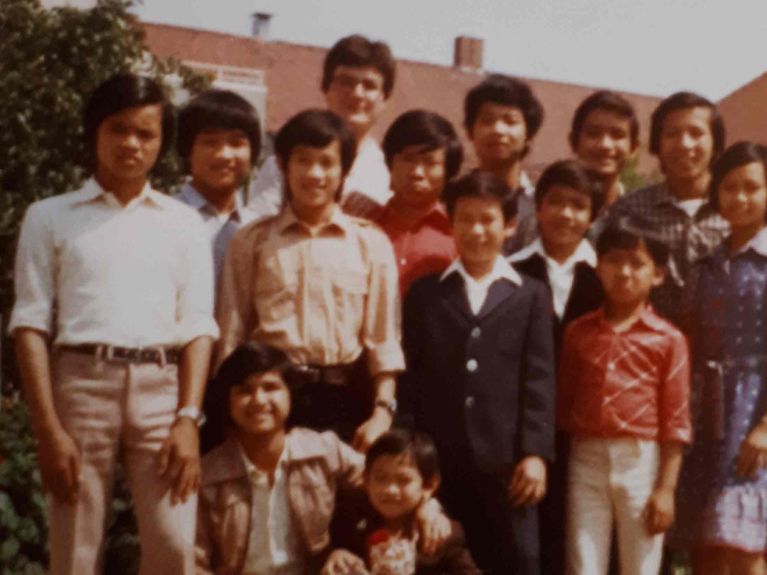
When asked what they like best about Germany, Hòa Trương picks the functioning network of social support, while Trịnh-Đỗ names the Basic Law. “Human dignity shall be inviolable,” he says, quoting the first article of Germany’s Basic Law. “I internalised those words while I was still at school. A dictatorship can never be a homeland.” Trịnh-Đỗ is invited by schools to talk about the story of the Boat People. “That’s really close to my heart, as it’s how schoolchildren learn about the value of democracy and the rule of law, and how much it means to be able to speak freely.”
